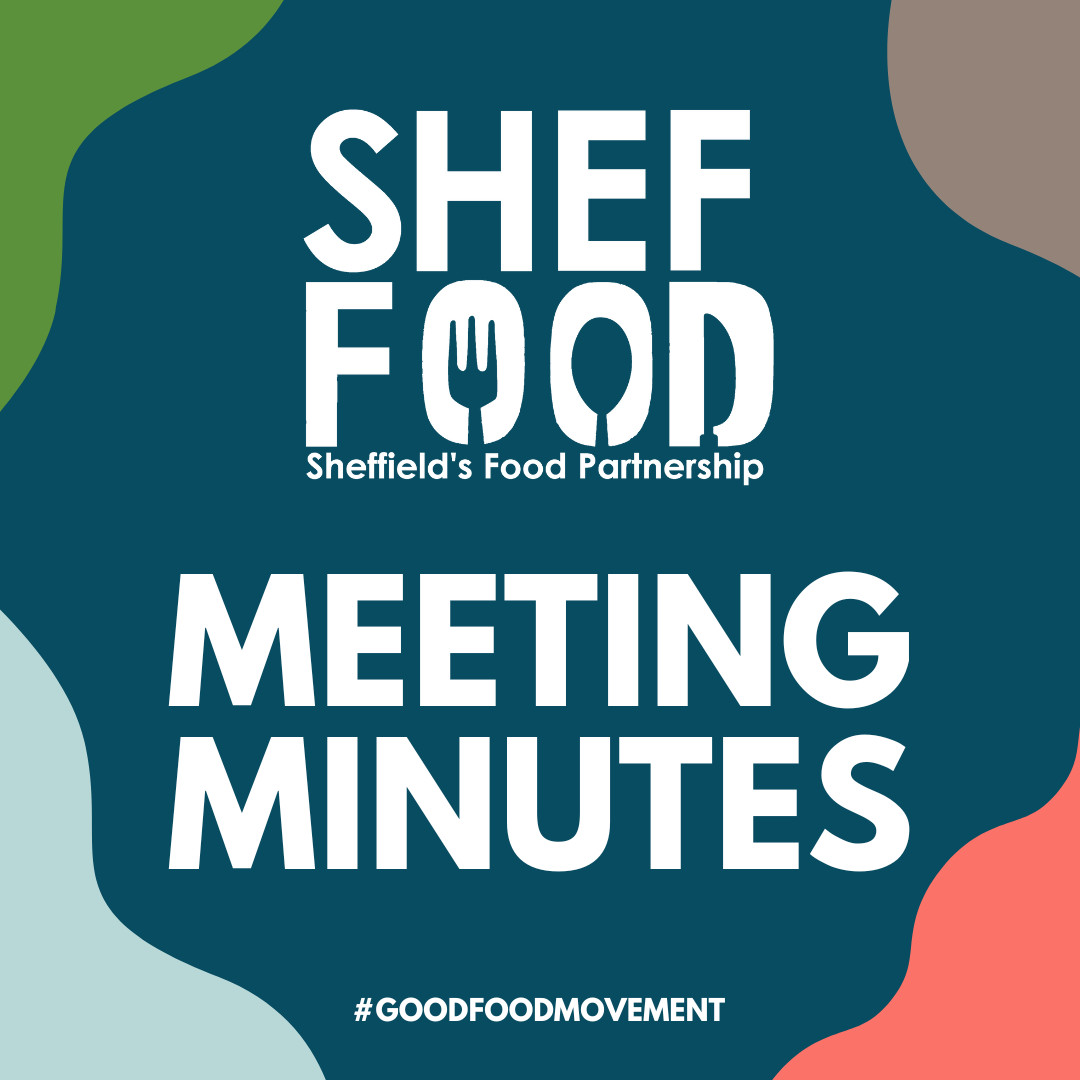Food Action Plan Working Group Meeting 1
19th January 2023, Leaf & Shoot Kelham
Attendees
| Selina Trehuez (online) | ShefFood |
| Chris Yap | Fix our Food; City, University of London |
| Luke Ellis | Leaf & Shoot |
| Fran HalsallGareth RobertsAlice Farmery | Regather |
| Richard Swan Toby Hyam | Sheffield Wheat Experiment |
| Toby Evans | University of Sheffield |
| Ruby Palmer Polly Jade Clarke | Sheffield Student Allotment Society |
| Daniele Rinaudo | Sheffield Fruit Trees |
| Rose | |
| John Le Corney | |
| Darrell Maryon | |
| Bob | The Green Party |
Summary of the meeting
The session began with a welcome from Selina, followed by a brief introduction to the work of the ShefFood partnership. Each stakeholder in attendance then had the chance to introduce themselves and explain their interest in the project.
Next to speak was Chris Yap, who outlined the vital role played by local food action plans in the sustainable development of cities such as Sheffield. Chris stressed the importance of focussing on concrete actions rather than commitments i.e. what can be done/ what practical steps can be taken to improve Sheffield’s food system?
The next part of the session involved dividing into breakout groups to discuss the key issues and opportunities associated with each Action Plan heading. These are:
- Compost
- Land availability
- Education and training
- Investment
- Decarbonisation
(See below for detailed outline of discussions)
After a 15 minute period for discussion, each sub-group had the chance to give feedback to the others. After a brief lunch break, attendees changed groups and this exercise was repeated once more.
The session concluded with a summary from Chris Yap, who thanked attendees for their participation. He noted the synergies between sub-groups. Chris then asked two questions:
- Given the scale of the challenges, is there anything that your organisation is doing already to help?
- What would your organisation do with £25000?
These questions were answered by Luke, Fran and Jade.
- Luke (Leaf & Shoot) – investment in the design and construction of innovative composters for use in urban areas.
- Fran (Regather) – help the farm take on apprentices.
- Jade – establish food sustainability course at the University with food systems focus, develop city-wide food infrastructure
After the formal discussion ended, Luke gave attendees a tour of the innovative sustainable growing and composting facilities in operation at Leaf & Shoot.
The next meeting is scheduled for 23rd February.
Outcome of sub-group discussions
- Compost
Issues
- Need to define exactly what is meant by composting as many different understandings/ definitions exist.
- Gaps in public knowledge/ understanding may act as a barrier (link to education/ training).
- PAS certification – difficulties around this.
Opportunities
- Need for multiple different levels to work simultaneously – municipal, community, individual.
- Central government has an obligation to fund costs associated with separate disposal of food waste.
- Generation of good quality compost has potential to rehabilitate degraded soils and boost productivity.
- Potential for collaboration with Green Estates and Veolia
- Land availability
Issues
- Tradition of market/ allotment gardening has declined since the 19th century. Food is now deprioritised as an economic activity.
- Lack of usual land. Other activities, e.g. horse grazing/ agroforestry, are seen as more profitable than peri-urban agriculture.
- Lack of skilled labour availability (link with education/ training)
Opportunities
- Need to ‘think outside the box’ when considering where land might be available – e.g. schools, parks, brownfield sites, peri-urban land.
- Polytunnels/ hydroponic growing more suitable for urban areas with poor soil quality.
- Potential for pop-ups in certain sites, e.g. processing facilities.
- Multiple products – more financially sustainable
- Possible solution – start a land trust to manage land availability and act as an aggregator of land and investment.
- Local Authority as a partner facilitating land access.
- Labour market opportunities
- Education
Issues
- Significant gaps in provision starting at primary school level and moving up to secondary/ college/ apprenticeship level.
- Growing/ horticulture not on National Curriculum.
- Horticulture is not viewed as an attractive career pathway for young people.
- Food system reliant on foreign labour.
- Convention routes into the horticultural industry are not suitable for urban/ peri-urban growing.
- Lack of accessibility for young people, asylum seekers etc.
Opportunities
- Need to contact existing institutions that work with schools to see how they could be recreated in Sheffield e.g. GROW – Totteridge Academy, Barnet
- Partner with Sheffield City College to deliver apprenticeships? Needs investment.
- Farm open days/ visits for students to introduce them to career pathway.
- Access to outdoor space, shared between different schools (link to land availability).
- Potential for hydroponics for schools with lack of land.
- Integrated learning in outdoor classrooms (e.g. combines maths, science and cooking).
- School pupils learn how to grow food that is then used in school kitchens.
- Natural History GCSE was recently introduced – potential for new Horticulture qualification.
- Investment (not directly discussed)
- Decarbonisation
Issues
- Food is often seen as lower priority than housing/ transport etc., although it contributes significantly to greenhouse gas emissions.
- Structural problems in data collection and analysis
- Need to tackle carbon emissions at different stages of the food supply chain from inputs (link with compost) to production, distribution, retail and consumption.
Opportunities
- Need to translate actions already happening in carbon reduction terms i.e. connection between energy and food. Also need to consider other greenhouse gases e.g. methane.
- Need to better understand the carbon footprint of Sheffield’s food system and ask what might decarbonisation look like in the food system? (Scope 1, 2 and 3).
- Want to see support and promotion of examples of best practice and progress.
- Food should be placed at the same policy level as energy, transport and housing.
- Carbon reduction is best achieved through multi-functional activity on land – not just monocropping.
- Link with local environment groups/ nature recovery network

